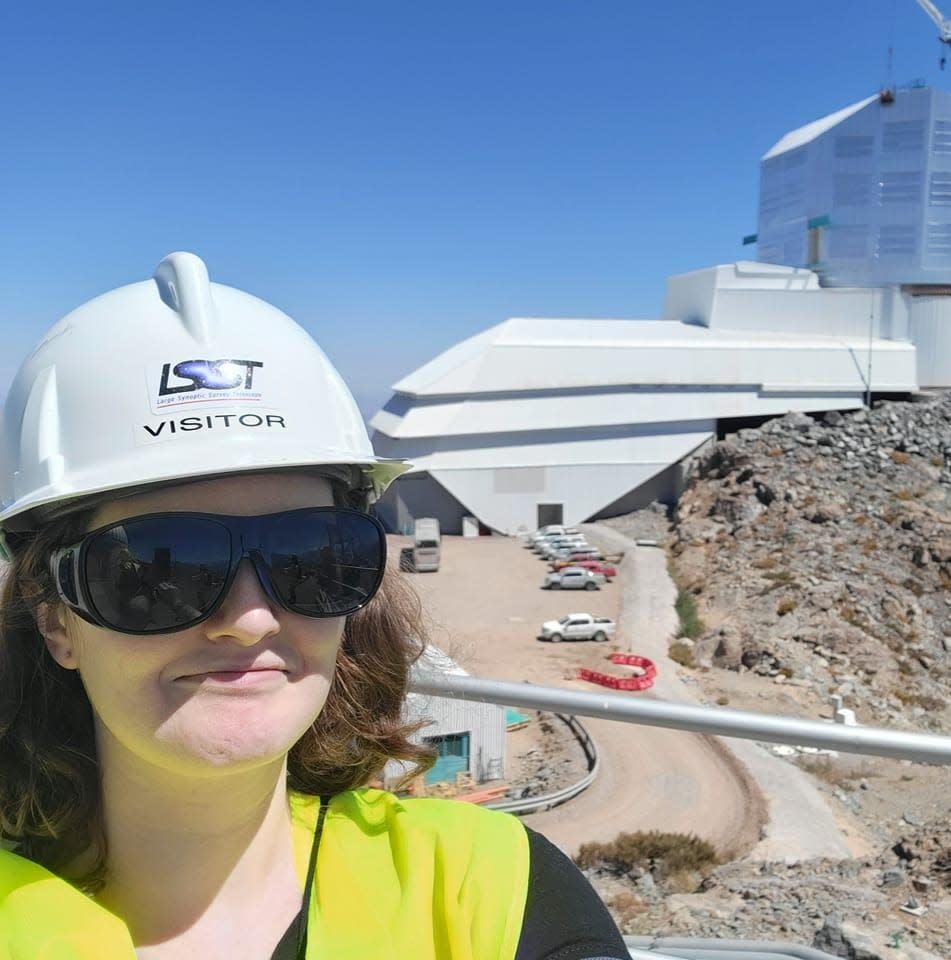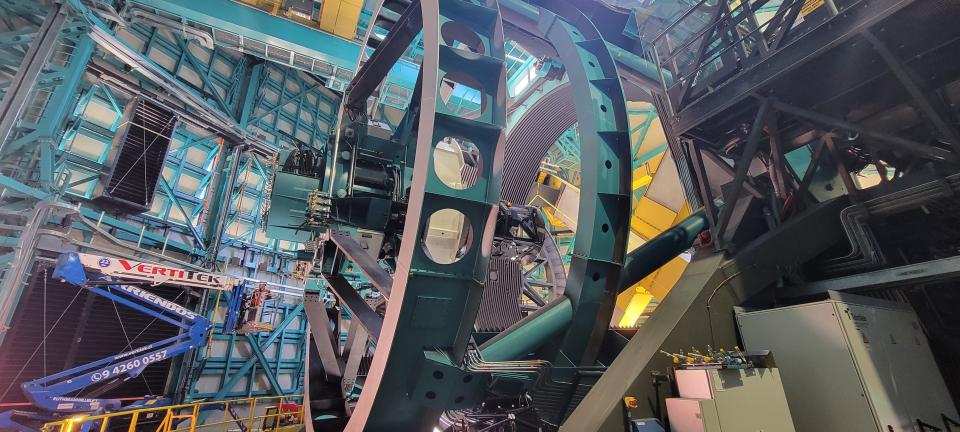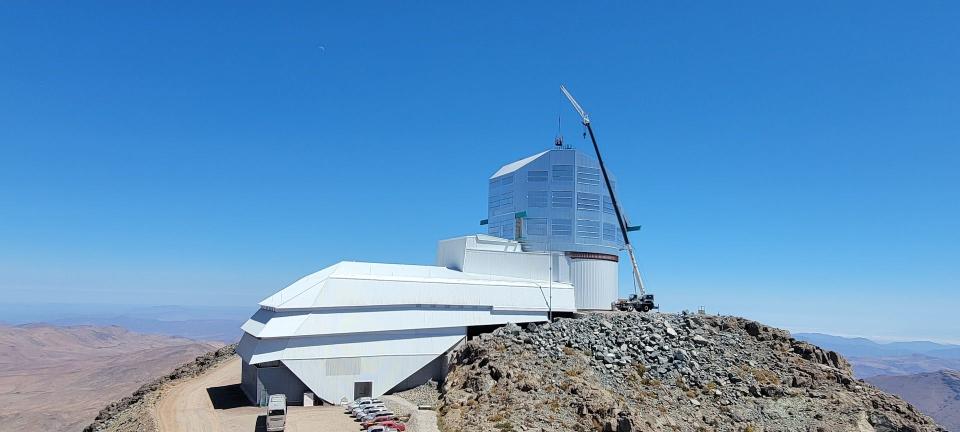Meet the Olympic College grad working on the groundbreaking Vera C. Rubin Observatory

- Oops!Something went wrong.Please try again later.
In March of 2023, Erin Howard finally made an in-person visit to the groundbreaking Vera C. Rubin Observatory at the summit of Chile's Cerro Pachón.
"It was great," said Howard, a Bremerton resident who uses they/them pronouns. "I cried. And then I got sunburned in my eyes and cried some more."
The Rubin Observatory has been in the works for decades, and will finally begin its ten-year survey of the Southern Hemisphere sky in 2025. The observatory, which cost upwards of $500 million to construct, boasts the largest camera ever built for astronomy and astrophysics, according to Rubin's website. In its first two months of operation, Rubin will "collect more data than all the other telescopes in history combined," said former Olympic College professor Bob Abel, who has volunteered for Rubin since 2008.
Seeing Rubin in person was a milestone for Howard, who first knew that they wanted to work for the project in 2015, after Abel brought Rubin's team to Bremerton for their yearly retreat. (At the time, the observatory was known as the Large Synoptic Survey Telescope, or the LSST.) As part of the retreat, Abel organized a series of pop-up talks and workshops around downtown Bremerton.
"One of the nights, one of the astronomers said, 'You know what, we have a lot of data that we need to process, and humans can't physically go through all of this," Howard said. "'We need computer scientists to go through all this data."
Howard had dropped out of college in their freshman year, and was already considering returning to school. But the Rubin talks gave them the shove they needed. Soon after, they enrolled at Olympic College, determined to eventually work for Rubin.
"The Rubin visit to Bremerton changed my career path," Howard said.
Howard's 'meandering path' to Rubin
Howard, who was born and raised in Bremerton, described their high school self as "one of those people who was either an A or F student, depending on whether I liked the class." They participated in Running Start, and said they probably would have dropped out of high school altogether if not for the program.
After high school, Howard attended a small Arizona college with an astrophysics program, but struggled with undiagnosed learning disabilities. They were later diagnosed with autism, OCD, and ADHD, "the trifecta of unpreparedness if you don't have accommodations," they said.
Howard dropped out, returned to Bremerton just in time for the 2008 financial recession, and spent a few years searching for work. Around 2010, they got their foot in the door of the tech industry — first with data entry, then website testing. Eventually, they taught themself to code.
When they heard about the Rubin talks coming to Bremerton, they initially weren't sure they wanted to attend.
"I was very hesitant to go," they said. "Because it was all like, I could be here already. I could have been one of the students giving the science presentations at the planetarium. I could have been one of the bigwigs giving the presentations, if I didn't drop out. So I was very hesitant to go — but I was really glad I did."
After enrolling at Olympic, Howard earned an associate's degree, then transferred to Western Washington University. There, they majored in physics and math/computer science, with a double minor in astronomy and statistics — "very much setting myself up to work for Rubin."
In 2022, after Howard was rejected from a graduate program at the University of Washington, they reached out to a UW scientist with whom they were already doing research.
"[I] said, 'Hey, look, I know you have a lot of Rubin scientists,'" Howard said. "'Can you help me get a job there?' And he said, 'Absolutely.'"
That connection was the final step of what Howard calls their "meandering path" to their dream career. Today, they operate and test software pipelines in their role as a research scientist for Rubin's Data Management team.
A series of coincidences — and a mentor for life
In a fun twist of fate, fellow Bremertonian Bob Abel played a role in almost every welcome change along Howard's path to Rubin.
In addition to bringing Rubin scientists to Bremerton, Abel spearheaded the community workshop format that Howard witnessed in 2015. Meanwhile, a connection made at the Rubin talks got Howard an interim job at Bremerton's Pacific Planetarium — a job that introduced them to Abel, a friend of the planetarium's owner.
Although Abel never taught or formally advised Howard while both were at OC, he became a source of support for them during their college years and beyond. He is constantly forwarding them links to conferences, programs, and other opportunities, Howard said.
"Everything he does is a learning opportunity, a mentoring opportunity," they said. "He's...what I aspire to be. I want to grow into the role of a professor and advisor and mentor, like Bob was for me."
Abel is an affiliate for UW's Institute for Data Intensive Research in Astrophysics and Cosmology, or DiRAC, which works closely with Rubin. For years, he balanced his Rubin work with teaching, until retiring from OC in 2022.
"I'm just really enjoying this pace," Abel said of retired life. "I love teaching. I taught for 30-some years, but I don't miss it. It's like I've always just wanted to have the time to slowly work through this stuff."
Abel currently works on analyzing simulated data coming down the software pipelines that Howard maintains. He noted that Rubin is revolutionary in part because all of the data produced by the observatory is available to researchers for free.
"Pretty unusual in any field of science," Abel said. "It's very democratizing."
In 2025, the simulated data that Abel analyzes will be replaced by real data from Rubin's enormous camera.

Excitement for what's to come
Both Howard and Abel are excited for Rubin to start its survey of the night sky.
"This project, and other telescopes that are coming out like the [James Webb] and the Euclid, they're going to change what we know about the universe," Abel said. "And who knows what's going to come of that?"
Scientists say the survey, which is known as the Legacy Survey of Space and Time and also uses the acronym LSST, has four main goals: understanding the nature of dark matter and dark energy; creating an inventory of the solar system; mapping the Milky Way; and exploring "transient" objects, or those that change position or brightness over time.
Abel put it this way: "With this project, if I know the language and I know the questions, I can ask the universe directly any questions I want."

The LSST will also help identify asteroids with trajectories that would take them dangerously close to Earth, Howard said.
"It really truly tells us where we are, and our neighbors, and whether our neighbors are trying to hurt us," they said, adding, "That's what I usually tell people who are like, 'Why should we fund these space things?'"
Howard is nearing their two-year anniversary with Rubin, and noted that although the LSST is set to take ten years, it will "probably" get extended another ten years. An indefinite extension would be Howard's best-case scenario.
"I would love to make this my career project," they said. "If [Rubin] can get all of the years, and I can work with Rubin for all of those years, I would be very happy."
This article originally appeared on Kitsap Sun: Vera C. Rubin Observatory project includes Bremerton resident

